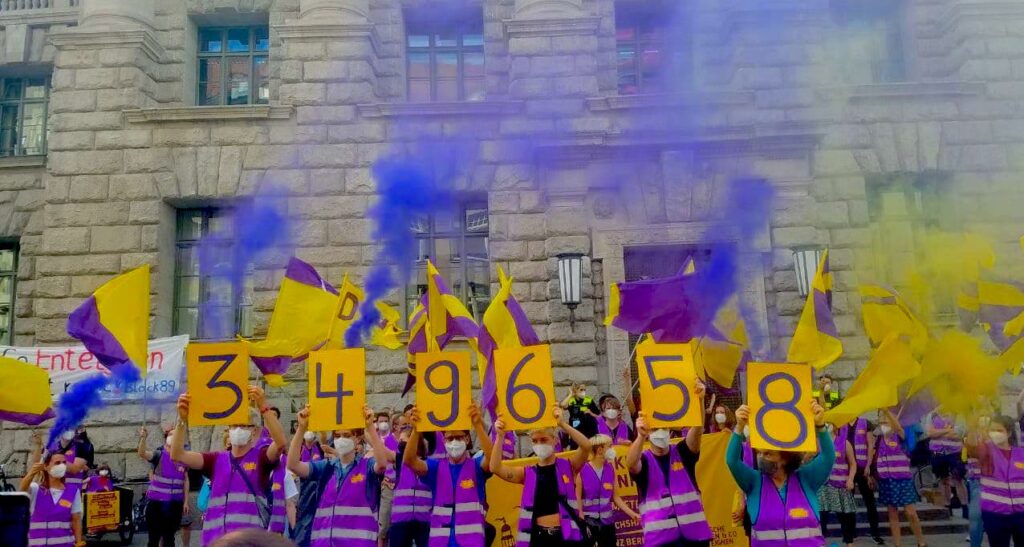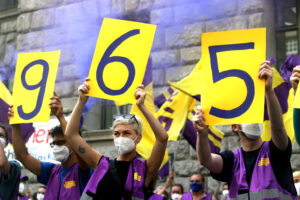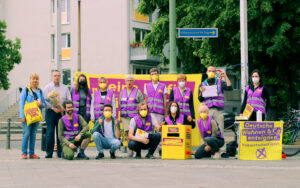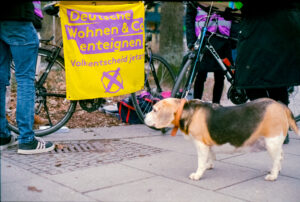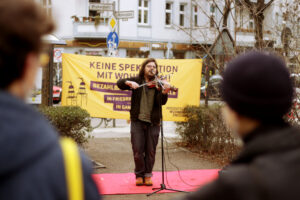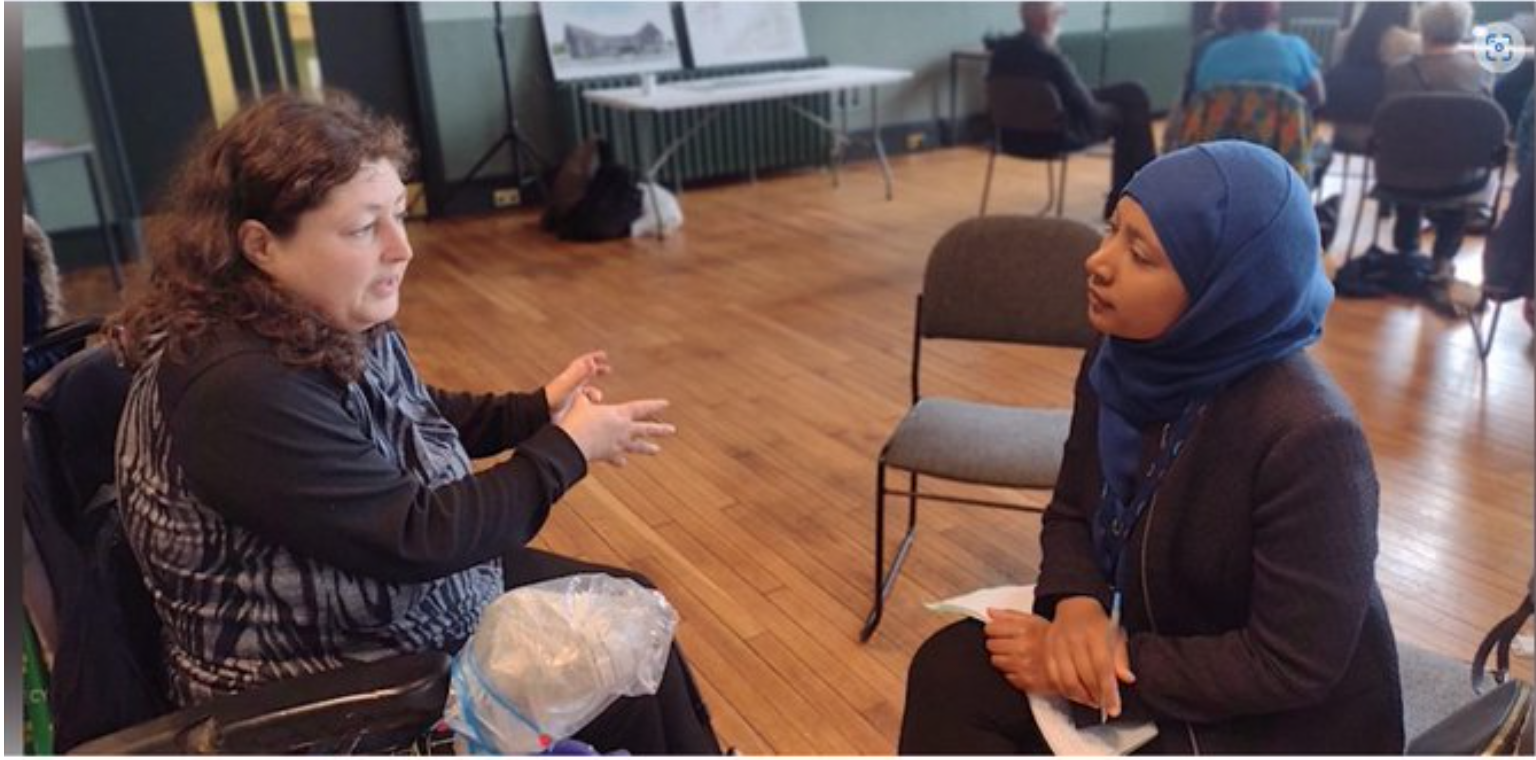By Members of Deutsche Wohnen & Co Enteignen (@dwenteignen)
On September 26th Berliners will head to the polls to vote in a referendum, the result of which may have seismic implications for the right-to-housing movement everywhere. The issue at hand is a proposal that the government seize and take into public ownership more than 200,000 homes. For this special report, GMHA have been in conversation with organisers from Right to the City, the English language working group of Deutsche Wohnen & Co Enteignen, the organisation leading the campaign for a ‘Yes’ vote in the referendum.
What housing are you campaigning to expropriate, and how did these large housing stocks come to be in private hands?
Andrei: We want to expropriate and then socialize all housing that is owned by corporate landlords who own more than 3,000 apartments. That will add up to at least 240,000, or 11% of Berlin’s apartments. We cannot be sure of the exact number because the ownership structures of these corporations are not transparent. Not even the local government knows who owns what and how much is paid. Regardless, corporate landlords control a significant proportion of Berlin’s housing and have gained a very influential position over the conditions of Berlin tenants. These landlords push for the highest rents and highest rent increases, and because of the number of apartments they own, their practices drive up the rents in the whole city.
This concentration is a symptom of the financialization of Berlin’s housing, which has become an investment for global capital management funds. The financialization of housing is of course a global trend, and Berlin is a particularly telling example of how investors can take advantage of previously low rents in order to make high profits. Backed by investment funds, the large companies that we are targeting not only bought the housing stock of smaller landlords. They also acquired much of Berlin’s former state-owned social housing. In 2006, Deutsche Wohnen bought 60,000 social housing apartments from a Social Democratic Party-led Berlin state administration. And it bought them for €450 million – that means around €7,500 per apartment!
In the hands of investment firms, because of their connection to the stock market, housing management becomes purely profit-driven. They buy cheap, disinvested apartments, often inhabited by people with migration or poverty backgrounds, and maximise profit through rent increases, taking advantage of the so-called “rent gap” between what was being paid and what price could be reached ‘on the market’. In the area around Kottbusser Tor (“Kotti”), for instance, Deutsche Wohnen took over large amounts of social housing and raised the rents, without improving the conditions. These apartments were mainly inhabited by people with migration histories, especially from Turkey. The pressure these companies put on tenants is then closely connected to histories of discrimination and the two issues cannot be considered separately. The problem with having investors as your landlords, aside from the extreme and heightened profit motive, is also the social distance they have to the housing they own. They tend to have no connection whatsoever to the city, the building and its tenants. But local, small landlords can and are bad ass speculatory too, they often increase the rent alongside the big players. You will be surprised to hear that the way housing in Berlin is currently managed means that it’s geared to making the super rich even richer.
Where has this campaign for expropriation come from?
Ian: The initiative Kotti & Co., which started in 2011, has always demanded the recommunalisation of the social housing that had been sold off – to Deutsche Wohnen. A recommunalisation working group of Kotti & Co. formed in 2015 to develop strategies of how exactly to achieve the demand of socialisation on a large scale in Berlin (Kotti&Co, 09.2019).
In 2016, Deutsche Wohnen tenants elsewhere in Kreuzberg formed the Tenant Initiative Otto-Suhr-Estate in one large block that the company owned; the next year, this initiative networked with residents of twenty other Deutsche Wohnen estates and became the citywide tenant movement (Tenant Protest Deutsche Wohnen). Tenants of Akelius also banded together to form the Akelius-Mieter*innenvernetzun (Akelius Tenant Network).
People in Kotti & Co. noticed the potential of Articles 14 and 15 of the Grundgesetz, Germany’s constitution: the articles prescribe that private property rights are protected, but not without limit. In translation this reads “Property entails obligations. Its use shall serve the public good.” and that “Land, natural resources and means of production may for the purpose of socialisation be transferred to public ownership” in the event that this is not realised. The German words used can be interpreted to include housing. After consulting legal experts and other initiatives which had similar ideas, it was decided to escalate the pressure on policymakers by organising a citywide campaign for recommunalisation (Taheri, 2018).
In April 2018, DW&Co. Enteignen was launched as a full-fledged campaign. Initial stages consisted of raising awareness that the practices of Deutsche Wohnen are not compatible with the social harmony in the city, and using this publicity to further organise tenants at the local level (Taheri, 2018). The experience of maintaining the tenant initiatives resulted in the formation of the Starthilfe-AG (start-aid working group, a group that supported tenants who wanted to organise their apartment blocks), which became a working group of the new campaign. This group possessed the knowledge needed to help new tenant initiatives get on their feet quickly. This is the context from which the Deutsche Wohnen & Co Enteignen campaign emerged – organising at both the neighbourhood and city levels (Strobel, 2020).
What are the campaign's connections to the recent campaign over rent controls?
Mateo & CP: The Rent Cap is a separate initiative from the DWE Campaign. The Rent cap or Mietendeckel originated in 2018, when the jurist Peter Weber published a paper arguing that the federal states could enact regulations on maximum rents because of their jurisdiction over housing. His proposal failed to enter into discussion within the Linke-controlled Senate Department for Urban Development, but was taken up by some Berlin SPD members.
The campaign "Deutsche Wohnen & Co Enteignen!", a citizen initiative, had by this time gained popularity and seeing its influence on the public debate, the SPD leadership was pushed to launch "something of its own" (Mayor Michael Müller, SPD).
Even though a significant block within the party did not agree, the majority of the SPD (Social Democratic Party) voted against supporting the expropriation initiative and started campaigning to pass a law that would decrease rents when applicable, freeze the rent prices for 5 years, and apply strong fines to the companies who violated the law. Die Linke (The Left Party) supported the Rent Cap law and after some modifications and toning down, the law was passed.
Both landlords and their political lobby (CDU – Christian Democratic Union, FDP – Free Democracy Party and AfD – Alternative für Deutschland) worked against the rent cap. A lawsuit was filed with the German constitutional court, questioning Berlin's jurisdictional competence to enact such a law, at the same time that house owners quietly went on a landlords' strike, leaving apartments vacant thereby artificially reducing the supply of housing in the city for people searching. New tenants were expected to sign "shadow rent agreements", which included the rent that would have to be paid if the rent cap law was overturned. After the court ruled against the interests of tenants in Berlin, many of us are faced with shadow rent debts we are unable to pay.
The Bundnis Mietenwahnsinn, an open coalition between all of the housing initiatives in Berlin probably should be mentioned here, although the specific rent cap legislation did not arise from their demands directly. Meitenwahnsinn brings all the tenant and housing initiatives together for really large demonstrations where tens of thousands of people fill the streets of Berlin calling for an end to “Rent madness”! (Mietenwahnsinbündnis) formed to prepare the first Mietenwahnsinn protest, which took place in 2018. There are weekly meetings. Usually each group sends one or two delegates. The preparation for the yearly Mietenwahnsinn demo, usually in march, is the busiest, then there is a second demo usually in sept (coming up on the 11th). The Mietendeckel (rent cap) issue helped mobilise a large number of people to attend the Demo but generally themes for the Demo are open and depend on what people bring. Key groups involved are Zwangsräumung verhindern, also the Berlin tenants union / Mieter:innengewerkschaft, Mieterpartei, and Selbstvertretung Wohnungsloser Menschen, (self-represented/self-organised homeless people). The relationship between DWE and Mietenwahnsinn is one of mutual support.
What’s the social base of the campaign?
Ian & CP: There are several key contexts you need to understand about Berlin, to understand where the campaign has come from. The legacy of WW2 and the Cold War created a very specific demographic, physical and policy legacies in Berlin. In the island that was West Berlin there was rent control (the Mietpreisbindung). In the East there was state provided housing. More recently there is the Mitespiegel legislation which limits the per-square-meter price that can be charged based on location, modernisation, age of the building and so on.
Berlin is a city of renters – 85% of the city's residents are tenants. Tenants’ rights are strong, it is difficult to legally offer tenants a lease on an apartment that has a limited time period (conditions must be met, the tax office cares if you don’t meet them), it is common to have a lease without an end and tenants know that it it very difficult to carry out a legal eviction. One of the effects of the Mietspiegel legislation includes tenants resisting modernisation in order to resist the rent rise it will bring, this explains the continued existence (and popularity) of coal heated apartments in Berlin! However, the Mietspigel can only do so much. If the apartment is modernised, even just cosmetically, the rent goes up and the tenants are pushed out if they can’t afford it. As the average price of rent goes up in an area so does the legally allowable maximum rent that can be charged in every flat in the whole area. Interestingly, Deutsche Wohnen, who owns the largest amount of housing in Germany has used its well resourced legal department to try to overturn the Mietspiegel, (Mieterverein, 01.2019) to eliminate even this weak legislation.
Over the last ten years tenants have rights and their housing security has been eaten away. Between 2008 and 2018, rents for new leases in Berlin increased by 112 percent. This means that a large proportion of the residents of the city are directly affected by the issues our campaign addresses. Where there was once housing security, now there is stress and precarity.
What Berlin also has is a long history of tenant and housing movements and initiatives. There was and to some extent still is a strong squatting scene (Hoffrogge, 04.2021) that provides autonomous spaces in the city. Tenants associations that provide legal advice and representation are large and strong – you’d be hard pressed to find a tenant who is not a paying member.
Then there are the collective tenant initiatives that have formed to resist the displacement caused by the financialisation and commodification of housing. So to answer the question – the tenants of the city and their organisations are the social base of the campaign.
And how are you organised?
The referendum works in this way: initiatives can propose legislation if they collect enough signatures to oblige the government to hold a referendum. The signatures must be provided on a specific paper form along with the signer’s address and date of birth so that the election office can verify them as a resident of Berlin. The first phase required collecting 20,000 signatures – in the event 77,000 were collected between April and September 2019. Then the proposal was subjected to over a year of official legal examination before being declared valid. During this time, the government attempted to have DW&Co Enteignen agree to water down the wording of the demand to socialise housing to being a mere suggestion. The campaign held firm to its line and did not submit to this co-optation attempt. The parties of the state government could not agree on passing a socialisation law at this stage.
Therefore the campaign initiated the second phase, which required gathering the signatures of 7 percent of eligible voters in Berlin, about 172,000 people, with the aim of forcing a referendum on the issue. The approach to accomplish that was to organise Kiezteams (neighbourhood teams) in every district of the city, who could collect signatures in public places. Some of these emerged from the tenant initiatives. The barriers to entry were made low: every Kiezteam and campaign working group, as well as the whole campaign, hosted regular online meetings, as well as creating a mobile app in which anyone could view and join upcoming public collection drives. Many others also downloaded the form and collected signatures among their social circles and co-workers, without being bound into campaign structures.
Besides Kiezteams there are a number of thematic working groups. All of them have elected representatives in a group of twenty people that keeps the campaign together and deals with financial matters: the coordination circle. The general campaign meeting takes place every two weeks; these meetings are where major decisions are made democratically. The Kiezteams came together with the Sammel-AG (collecting strategy working group) at the Sammelrat (collection council), which also meets every 2 weeks. Now the required number of signatures have been collected, there are new working groups concentrating on turning out the vote and persuasive conversations.
The collection phase began under a severe Corona lockdown on 26.02.2021 and lasted until 25.06.2021 (DWe, 2021), by which time the campaign submitted 359,063 signatures to the election office. This was a record – despite the pandemic. DW&Co Enteignen had collected more signatures than any other such initiative in Berlin before. At the time of writing, this means that the referendum will take place on 26.09.2021 (Berlin election office, 01.07.2021), alongside the Berlin state and federal elections. The campaign estimates that about 2,000 activists were bound into its structures and collected somewhat regularly. Now they are door knocking, handing out the campaign newspaper, flyering and holding street conversations. There is a campaign bus. There is a campaign film. The DWE-App is chock a-block with ways to participate. We have pulled out all the stops!
What links does the campaign have to Die Linke, other left parties and the Trade Unions?
Alexander & CP: “Deutsche Wohnen & Co Enteignen!” is a non-partisan campaign that draws support from a wide swathe of Berlin’s voters, from all different political parties and backgrounds. The campaign, furthermore, receives support from a broad range of trade unions, including the Berliner Landesverbände (local branches) of Ver:di (a huge catch all Union) and the IG Metall (the largest industrial union in Europe) who have both lent their support to the campaign. The right to the city affects the working class directly, and we are fortunate to receive support from Berlin’s strong workers’ movement. In return the DWE campaign has supported the Unions, most recently joining striking nurses at Charite and Vivantes Hospitals.
From the start, Die Linke has been an integral supporter of the campaign. Die Linke members collected more than 32.000 signatures in support of the referendum (170,000 were needed and around 350,000 were collected) in the first half of 2021. The campaign’s support, however, does not solely rest with one party. It stems from the working people of Berlin who realize how fundamental the right to affordable housing is for basic life in the city. As a non-partisan campaign, we are, furthermore, forging a broad coalition to bring all those who believe in our mission together in solidarity.
At the time of writing, the lead SPD (Social Democratic Party) candidate for Berlin is making statements against expropriation. As she is likely to be part of the coalition government that will implement the socialisation of large corporate landlord owned housing, this shows that even if we win the referendum on September 26, the democratic struggle doesn’t end there.
Can you tell us more about the mechanism the campaign has used – the city-wide referendum? Has this been used as a recurrent tactic by the Berlin left for some years now?
Nik: The referendum is a tool for direct democracy in some states of Germany, and can be initiated on the state level. The first referendum occurred in the 1920s to expropriate and redistribute wealth from royalty, and was initiated by the communist party. However, the referendum failed, although a strong majority of Berlin voted in favour.
There have been a number of city-wide referendums in Berlin over the past 30 years. These initiatives have come from both the right and left, but in Berlin are more often left-affiliated efforts. It is fair to say that it is a common tactic by the Berlin left to push popular policy change, and includes other current efforts for a car-free Berlin center, and for climate neutrality in Berlin by 2030. However, these efforts involve a lot of people, require a lot of work, and are not always successful. If done with an organizing perspective and built up from below as it has been done in the case of DW& Co Enteignen, such referendums can open up spaces for making unprecedented connections on the neighborhood level, hence spurring politicization among people whose lives usually do not coincide.
Germany is a federal country and Berlin is a state which means that it has the power to legislate the socialisation of housing as proposed in the referendum. Furthermore, if we are successful in Berlin, it can be a model for other German states.
Successful referendums in recent years include a bill to disclose the partial privatization contracts of the city waterworks, the preservation of the entire Tempelhofer Feld (a 380-hectare former airfield that’s now a park).
How do you see overcoming the financial argument of the compensation to real estate companies?
Toni : Berlin can afford to expropriate Deutsche Wohnen & Co, because according to the German Constitution, the affected companies don’t have to be compensated with the exact market value of the apartments.
We propose that the public-law institution finance the compensation by issuing bonds to the companies that can be paid off through the steady rental income. This would add no additional burden to the Berlin state budget. Once the loans have been paid off, the rental income can even be invested in building new housing.
Our fair rent model is based on desirable rents and uses them to calculate financially viable amounts of compensation. We assume that people should spend a maximum of 30% of their income on warm rent in order to be able to live well. We therefore set a rental price of € 4.40 per square meter, as it would also be affordable for low-income people in Berlin. Such a rent could pay a compensation to the companies of € 8 billion.
We think our model is fair because it grants the highest amount of compensation that can be reconciled with the goal of budget-neutral socialization as well as avoids any form of speculation on rising rents in the future.
And if you win – what then? Is there a risk of it being struck down in the courts similar to the Mietendeckel being ruled unconstitutional?
Beatriz: If we win the referendum, it is almost certain that private real estate companies’ representatives will challenge the campaign in court. However, the legal standing of the socialization campaign is much more solid that the Mietendeckel. Whilst the constitutionality of the latter was challenged by lawyers from the very beginning, various legal, governmental, and scientific bodies have reported on the legality of socialization of apartments from real estate companies with more than 3,000 apartments.
The German Constitution (“Basic Law”) divides authority between the federal government and the states. The federal government can exercise authority over the states only in those areas specified by the Basic Law. Otherwise, each German state has authority to set its own rules. In 2015, the federal government imposed a “rent brake”, which allowed landlords to increase rents by no more than 10% above the local market level. Proving insufficient to stop soaring rents in Berlin, the state of Berlin introduced its own “rent cap” law, the Mietendeckel. The Mietendeckel was ruled unconstitutional because according to the Basic Law, rent law is one of the areas over which the federal government exercises authority over the states. Thus, it is not up to the Berlin Senate to regulate rent. A measure like the Mietendeckel would have to be introduced at the federal level, akin to the “rent brake” introduced in 2015.
The legal context surrounding the socialization campaign is completely different. The article invoked by the Deutsche Wohnen & Co. campaign is part of the Basic Law of the German Federal Republic. The distinction between federal and state powers does not come into play here. It is purely a matter of whether the German constitution allows for the socialization of apartments. Article 15 of the Basic Law says “Land, natural resources and means of production can be transferred into common ownership or other forms of public economy for the purposes of socialization through a law that regulates the type and extent of compensation”. Because Article 15 has never been invoked before for the purpose of socialization of apartments, the Berlin Senate Department for Urban Development and Housing asked three constitutional lawyers for their assessments on the legality of the socialization campaign. All came to the same conclusion: yes, it is legally possible [see full reports here and discussion here]. Moreover, the scientific services of both the Bundestag and the House of Representatives reached the same conclusion: the socialization of housing is legally admissible under the Basic Law of Germany. There is thus plenty of evidence that the socialization campaign is legal and won’t be struck down in the courts like the Mittendeckel. The point of legal contention promises to be the “extent of compensation” owned to the private real state companies whose apartments would be expropriated. Our campaign explains on our website how it calculated the amount of compensation and how it can be paid for.
The campaign centres around the ‘right to the city’, which many in Berlin are excluded from due to not having the relevant citizenship to vote in the referendum, or to offer a signature that is counted as valid on the petition for the referendum. How have these barriers to the democratic process impacted your work and how has it changed the messaging for the campaign?
Trevor: In the signature collection phase of the DWE campaign, an incredible 359,063 signatures were collected and submitted. However, 32.7% of these were invalidated by the Berlin electoral office, mainly because those who signed do not have German citizenship. At least 1 in 5 people living in Berlin are not eligible to vote in the referendum, meaning many who call Berlin home are disenfranchised from participating in this referendum on a subject that directly and deeply affects their lives.
Beyond the profit-driven housing practices described above, the housing market is rife with racism, prejudice, and discrimination, and those with less security, for example due to poverty or a migration background, are often exploited. Yet we are not given a voice to vote on this — a clear failing in a democratic system. DWE’s working group, Right to the City for All, seeks to address this democratic deficit by fighting for changes to Berlin’s election laws. The collection of approximately 50,000 political signatures (those not counted as valid by the electoral office) demonstrates that these changes are desperately needed.
For the next phase we have created a flyer for the doorknockers to share with people who are not eligible to vote that outlines other ways that they can get involved – this is available in Polish, Turkish, English and German. We have also added our voices to the ongoing, decades long fight for voting rights for migrants by holding our own demonstration.
What is the current political opposition to the campaign, for example is there a split within the red-red-green coalition?
Brad: The reaction to Deutsche Wohnen & Co. Enteignen among the parties of the current ruling coalition in Berlin, the so-called Red-Red-Green coalition (Die Linke, Social Democratic Party and the Greens), has been largely positive. The campaign has successfully worked to bring both the language of expropriation and the discussion of radical solutions to the housing crisis in Berlin into the political mainstream.
Concretely, the members of the Red-Red-Green (Die Linke + Social Democratic Party + The Green Party) coalition have reacted differently to DWE. As mentioned, Die Linke not only committed to directly supporting the campaign, but groups organized through Die Linke collected 32.662 signatures over the past four and a half months; a major, material contribution to DWE by any measure. While the Green Party in Berlin didn't directly collect signatures for the campaign, delegates to a party meeting in March sent a strong positive signal when they voted (by a large majority) to back the campaign's goal of having a popular vote on expropriation. That being said, the Green’s platform only includes expropriation as a last resort for addressing the housing crisis and attitudes in the party are still split. The leadership of the Berliner SPD has been even less supportive of DWE, with several prominent Social Democrats speaking out recently against the initiative. The current SPD mayor Michael Müller called it “a confrontation that doesn’t help us move forward”, while the relatively right-leaning head of the Berliner SPD Franziska Giffey rejected the idea of expropriation tout court and pointed instead to plans for more construction in the coming years as the solution to Berlin’s housing problems. However, regardless of the positions taken by some of the senior members of the Berliner SPD, the campaign is excited to be shaping the mainstream discourse around the housing crisis (a recent article in Die Zeit, which has a comparable political slant to the New York Times, is titled “Expropriation Can be a Part of the Solution'') and sees drawing these figures into directly addressing the strategy of expropriation as a win.
While Red-Red-Green may not be presenting a completely positive, united front on the question of expropriation, more leftist members of the coalition, in particular certain groups within Die Linke, have provided valuable support to the campaign. Further, whatever differences there may be amongst these three parties, we are confident that the voters who brought the current coalition into power, including those who voted SPD, are broadly in support of DWE and expect to see that reflected in the results of the election in September.
The referendum falls on the same day as Germany’s federal elections. How prominent are these issues of rent controls and public housing in them?
Berta: To be 100% enthusiastic: we made it relevant! DWE made it relevant and brought it into the public discourse. We ask for political parties to declare a position on the theme. To say it a bit less enthusiastically: the Mietendecke being overturned in April means that the parties who identified as promoters of that law (the SPD for example) are now undifferentiated from the right wing parties that opposed it – the CDU (Christian Democratic Union) and the FDP (Free Democracy Party) who all oppose expropriation. All of these parties argue that building new housing is a more appropriate solution – and they are being aided in spreading this message by some fancy front campaigns that look like they come from the real estate industry. Let’s see what happens!
Are you confident of winning the referendum?
Camilo: The short answer? Yes! The energy of the campaign and the nearly 2,000 activists involved is very high. There’s a lot of positivity and it’s no small achievement that we collected a record-breaking number of signatures for a referendum initiative in Berlin. And this happened with all the restrictions of the pandemic. In the upcoming months, even more people will know about the campaign and the opportunity we have to reclaim the city for its people. This energy is only going to grow.
But, we acknowledge that it will not be easy. The opposition from these corporations, their shareholders and the political parties that support them is going to be strong. They have powerful lobbies. But as it stands, the city is unaffordable for many and at the root of that is the speculation of housing stock by these large companies. It is poised to become even more unaffordable if things don’t change. We believe in the strength of our arguments and that those arguments will resonate with Berliners, who are able to vote on September 26th.
This interview was done with a collective of members from DWE. They say of the process for answering the questions: Instead of handing the questions to someone who already knew the answers we decided to pair mentors with learners and answer one question each. This way more of us could get our heads around the information. This is a difficult task because many of us are not fluent German speakers, so we are not able to access the information about the history of housing in Berlin or even the basic campaign material. The response to the call out to our 150 person list was overwhelming, we needed 11 people but almost 40 people indicated they would love the chance to get some support to work out what the hell is going on. One of the reasons that the english language working group (Right to the City) of the DWE (Deutsche Wohnen & Co Enteignen) campaign exists is to bridge this gap between the german speaking parts of the campaign and the non-german speakers. Thank you for this opportunity to share the knowledge amongst us and with a wider audience.
References:
https://iniforum-berlin.de/dossier21/
13 September 2021

